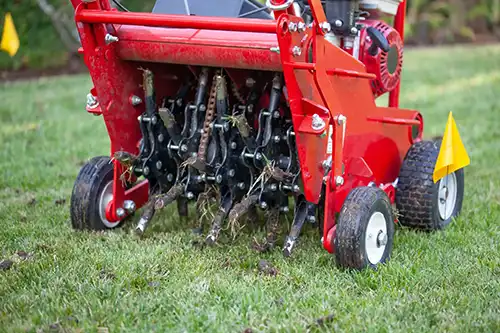How Can Soil Compaction Damage My Lawn?
When soil becomes compacted, it negatively affects the health and strength of your lawn, making it more prone to damage and less capable of thriving. The denser, harder soil prevents grass roots from penetrating deeply, which can lead to numerous issues over time, such as:

- Shallow Roots: Compacted soil prevents roots from penetrating deeply and spreading, resulting in shallow root systems that struggle to access water and nutrients, making your lawn more susceptible to drought and nutrient shortages.
- Reduced Nutrient Absorption: When soil is compacted, roots can’t access the necessary water, nutrients, or oxygen, leading to weak grass that is more vulnerable to diseases and other issues.
- More Weeds and Fungus: Weeds thrive in conditions where grass struggles and compacted soil often creates an environment where weeds can easily take over. Poor drainage can also encourage pests and fungal growth.
- Poor Drainage: Compacted soil blocks water and air movement, causing water to pool on the surface and create a waterlogged lawn. This can attract pests and promote fungal growth.
- More Thatch: Compacted soil slows the natural breakdown of dead grass and roots, resulting in an accumulation of thatch that can suffocate your lawn.
Need Lawn Care? We Can Help.
Click the button below to leave your information & we'll be in touch in an hour or less.
Need Pest Control Service?
Leave your information below and we’ll be in touch with a FREE quote!
"*" indicates required fields
*During normal business hours. After hours calls will be returned the next business day.
What Causes Soil Compaction?
Soil compaction takes place when the air spaces between soil particles shrink, increasing the soil’s density. This causes the soil to become tightly packed, limiting the flow of water and air. While natural factors like rainfall can contribute, it is usually human activities or other influences that cause compaction, including:
- Construction: The weight of cars and construction machinery driving over your lawn exerts pressure on the soil, causing it to compress over time.
- Foot Traffic: Frequent walking on your lawn may not seem harmful, but consistent foot traffic can crush the soil and damage grass blades, leading to compaction.
- Environmental Factors: Natural elements like rain and freeze-thaw cycles can impact soil health over time, contributing to compaction.
- Nearby Farming: The use of heavy machinery, such as tractors, for farming near your lawn can lead to soil compaction from repeated weight and pressure.
How to Fix Compacted Soil
Compacted soil can cause serious damage to your lawn and nearby plants. If you notice your turf showing signs of stress, it’s crucial to contact a professional lawn care service right away. Getting expert help early on will make restoring your landscape much easier.
Experts have the right tools and knowledge to pinpoint the root causes of your lawn’s health problems. They can also carry out lawn aeration to relieve soil compaction, creating optimal conditions for your turf to flourish.
How can soil compaction damage my lawn Serving Ocala, St Augustine, Fruit Cove, Palm Valley ?
Atlantic Beach | Jacksonville Beach | Spring Lake | Brooksville | Ridge Manor | Nocatee | Yulee | Fernandina Beach | Duval County | Hernando County | Marion County | St Johns County
Home » Lawn Care » Lawn Learning Center » How to Take Care of Your Lawn’s Soil » How can soil compaction damage my lawn?
